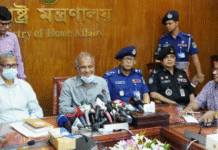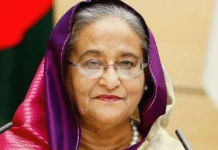Mass arrests of opposition activists continue
Record inmates in jails
Muktadir Rashid | , Nov 10,2018 | The New Age
Opposition activists, mainly from the Bangladesh Nationalist Party, continue to be arrested in a huge number across the country, which has crowded the prisons more than their capacity.
The number of inmates in the country’s 68 jails reached 97,746, as of November 4, against their capacity of 36,614 ahead of the 11th parliamentary elections scheduled for December 23.
Not only opposition leaders or organisers, but also the supporters or even their families also continued to be arrested across the country.
BNP-backed volunteer organisation Swechchhasebak Dal president Shafiul Bari Babu said that the crackdown continued across the country and their leaders and activists were staying out of their areas to avoid arrests as the police continued raiding their houses.
Court premises were seen overcrowded in recent days as opposition leaders and activists or their families rushed there for their bails while witnesses said that hundreds of families were crowding jail gates to visit the detained leaders and activists.
Farzana Akhter Meem, 9, along with her mother Sharmeen Sultana Eti was seen waiting on the Dhaka metropolitan court premises Thursday afternoon to see her father Muhammad Faruk for a glimpse.
Farzana was not sure why her father was arrested but her mother Sharmeen said her husband was arrested at Narinda on November 7 only for supporting BNP.
Many other anxious families were seen waiting outside the courtroom on Thursday as many wanted to provide desired meals to their relatives.
When prison vans were leaving the court premises, the family members were seen rushing toward the vans to say bye or to know which jail they were heading for.
‘I could meet my husband today [Friday morning]. There were waves of people around Keraniganj jail but I could manage to see my husband as I failed to see him on court premises on Thursday,’ said anxious Sharmeen.
Pro-BNP lawyers were seen exhausted for running one court to another, said BNP law secretary Sanaullah Mia.
Many families were unwilling to speak to journalists fearing further problem. Seeking anonymity, a family member said that his brother Iqbal Hossain was a supporter of BNP at Chawkbazar in Dhaka and was arrested Thursday afternoon, but the family was not told about the case in which he was arrested.
‘Iqbal was arrested only because of his involvement in oppositional politics,’ he said.
The jail headquarters officials said that the prisons had record number of 97,746 inmates on November 4 opposition alliance Jatiya Oikya Front’s rally in Dhaka on November 6. On Friday, the number of inmates was 93,623.
The number of inmates was 92,743 on October 31 and 84,989 on September 6.
Prison officials declined to make formal comments but claimed that arrests in anti-drug drives and crackdown ahead of expected polls have caused the increased number of inmates in the prisons across the country.
According to the jail statistics, the number of inmates was 97,746 on November 3 and 74,442 of them were detained, including 31,367 arrested in drugs cases.
The statistics showed that 954 people landed in jail on November 4 and 311 of them were held in drugs-related cases.
The number of new inmate was 1,758 on November 7 and 641 of them were facing drugs cases.
Former Dhaka jail superintendent Formal Ali said during his 36-year service he never saw the number of inmates exceeding 75,000.
The statistics showed that the number of inmates was 88,424 on August 13 which was the highest after 2005, when 73,192 inmates were in jails against the capacity of 28,668.
The number of inmates began rising in February before BNP chairperson Khaleda Zia was jailed in a graft case on February 8.
The number of inmates was about 77,500 with the average release of 2,000 and landing of 1,200 per day in early February.
Statistics showed that 74,141 under-trial prisoners, 17,831 convicts, 1,670 death row convicts and 82 people yet to be released after serving out the sentences, were in the 68 jails, as of November 7. Between August and November, the number of convicts increased by 360.
Bangladesh Nationalist Party on Wednesday submitted a list of 1,046 ‘fictitious cases’ filed against its leaders and activists to prime minister Sheikh Hasina during the dialogue between the prime minister and the Jatiya Oikya Front.
BNP assistant office secretary Taiful Islam Tipu said that they had documented 5,000 cases across the country and the list of one-fifth of the cases was handed over to the prime minister.
‘All the cases were filed by the police since September 1,’ Taiful said, adding, ‘in the 5,000 cases, the police named over 96,700 leaders, organisers, and even supporters.’
He said that they had a list of 7,000 leaders and activists in the custody of jail or law enforcement agencies in cases mostly field after September 1.
Taiful, who is in the process of documenting the list of ‘fictitious cases’, also said that there were over three lakh ‘unnamed accused’ in those cases which gave the police scope for arresting oppositional activists indiscriminately.
On November 1, during a dialogue between the Jatiya Oikyafront and the ruling Awami League, Hasina asked the opposition leaders to submit a list of political cases.
In a letter attached to the list, BNP requested the government to stop arrest and harassment of its leaders and activists in ‘false and fictitious’ cases and withdrawal of those cases.
Hasina, on November 1 reportedly assured to look into the matter so that none was harassed. BNP, however, alleged that the mass arrest continued.
BNP senior joint secretary general Ruhul Kabir Rizvi said that with the blanket and targeted arrest, the Awami League-led government wanted to make the polls-time situation more and more hostile to the opposition.
He said that the government wanted to keep the opposition activists and organisers behind the bars paving the way for the ruling party to win the unilateral elections.
The continued arrest is a pre-emptive attack on the opposition in an attempt to foil movement, Rizvi said.
BNP’s secretary general Mirza Fakhrul Islam at a rally in Rajshahi on Friday renewed their call to release their jailed party chief Khaleda Zia and other leaders and activists.
About the mass arrest and fictitious cases, police headquarters spokesperson assistant inspector general Shohel Rana said that the police chief already instructed the field units to examine the allegations of fictitious cases reported in media.
He said that the police could arrest anyone on suspicion but the police investigators needed to complete their investigation to say whether the arrest was justified.
Rights organisation Odhikar secretary Adilur Rahman Khan and rights activist Nur Khan Liton alleged that the arrests were being carried out ahead of elections targeting the opposition and dissent voices.
The increased number of inmates is basically the result of poor justice delivery system and people are being arrested in a mass scale in a pretext of fictitious cases, among others, said Adilur.
Nur Khan echoed Adilur and said the government wanted to create an atmosphere of fear ahead of the elections.
‘We have never heard of such number of inmates since liberation war,’ he said.
Plainclothes police on Wednesday picked Chattogram top BNP leader Shahadat Hossain from Dhaka metropolitan court premises when he was coming out after consulting BNP law secretary Sanaullah Miah.
New Age court correspondent reported that magistrate courts in Dhaka on on November 8 remanded about BNP 350 leaders and activists in police custody for interrogation in cases mostly related to their joining Jatiya Oikya Front rally in Suhrawardy Udyan on November 6.
The police accused them of vandalism and obstructing police from discharging duties.
A Sylhet court on October 7 sent 24 BNP leaders and activists to jail in a case related to political activities.
Ahead of the crackdown, the inspector general of prisons in August urged the government to build makeshift facilities inside five prisons in Narshingdi, Gazipur, Narayanganj, Munshiganj, and Manikganj to accommodate rising number of prisoners.
On November 1, prime minister Sheikh Hasina inaugurated five new buildings in jails increasing accommodation capacities by 2,036 inmates in the prisons.
More about:










